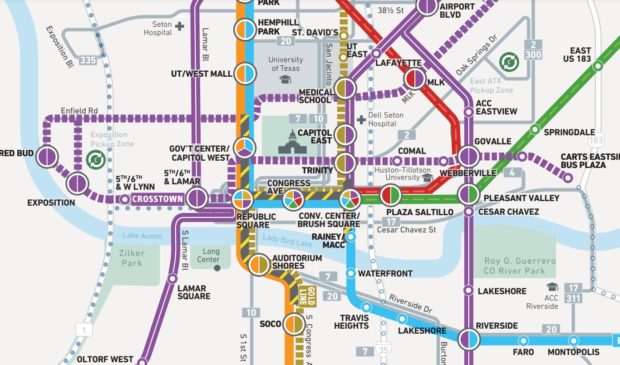City opens applications for $20M in anti-displacement projects
Tuesday, April 12, 2022 by
Chad Swiatecki The city is accepting proposals from community organizations involved in affordable housing and related services to apply for some of the $20 million available for anti-displacement efforts related to Project Connect.
At a news conference Monday, leaders from the Austin Housing Finance Corporation and the Housing and Planning Department explained that there is about $64 million available from the $300 million total approved by voters to combat gentrification that could be caused by the ambitious transit plan. Of that amount, $23 million will be used for land acquisition, $21 million will fund land development and $20 million will be directed toward community solutions to prevent vulnerable residents from being priced out of their homes as property values rise near train and bus corridors.
June 13 is the deadline to apply for some of the $20 million in community funding, with proposals falling into three categories: renter/tenant stabilization, expansion and preservation of home ownership opportunities, and other services focused on economic mobility with a housing component.
“Connect sends a clear message that our community values growth and equity,” said Rosie Truelove, director of the Housing and Planning Department. “The goal of the anti-displacement investments is to create a long-term impact with a focus on creating affordable housing units and asset-building opportunities that enhance people’s economic mobility and prevent displacement. Their investments can protect households living in areas vulnerable to displacement with solutions to help them to afford to remain in their homes and neighborhoods.”
Interested applicants can attend an April 20 virtual information session to learn more about the submission and evaluation process, including how the city will use a newly created equity tool that half a dozen city departments collaborated on to prioritize projects.
“Austin is known as a city of innovation. As our city experiences explosive growth, we must work intentionally to keep communities intact,” Nefertitti Jackmon, community displacement prevention officer, said in a statement. “To do this we must center community-driven solutions to address displacement. People nearest to the problems have relevant solutions; we must build mutual trust and respect and provide resources for the community to create these solutions. This is a new approach, and a necessary approach to build thriving communities.”
The proposal process offers opportunities for organizations such as Foundation Communities to expand services such as tax preparation, health care navigation and financial aid that it provides to renters from two centers in the north and south portions of the city.
Walter Moreau, executive director of Foundation Communities, said the expansion of transit will add more cost-of-living pressure on many residents who live near proposed train stops.
“More than ever we are serving families that are really stretched to continue to live in Austin and make ends meet,” he said. “So if we can help some of those people to get their taxes done for free, make sure they’re getting stimulus payments, earned income credits and child tax credits so they get the benefits they deserve … both of our centers are in transit corridors and we’re looking at whether this funding could allow us to expand our services.”
In addition to the potential service expansion, Moreau said his organization has two projects that could be eligible for Project Connect funding: The new Parker Lane apartment complex and an undisclosed land acquisition near a different train stop. He said those grants would help to cover construction costs that have increased by more than 20 percent over the past year.
“Fighting gentrification as a result of the creation of transit corridors is a complex thing and it’s going to take a multifaceted approach. A lot of the funding is for real estate because we’re going to see prices rise in the vicinity of train stops and I think it’s smart to look at providing services to people in those areas as well.”
The Austin Monitor’s work is made possible by donations from the community. Though our reporting covers donors from time to time, we are careful to keep business and editorial efforts separate while maintaining transparency. A complete list of donors is available here, and our code of ethics is explained here.
You're a community leader
And we’re honored you look to us for serious, in-depth news. You know a strong community needs local and dedicated watchdog reporting. We’re here for you and that won’t change. Now will you take the powerful next step and support our nonprofit news organization?










